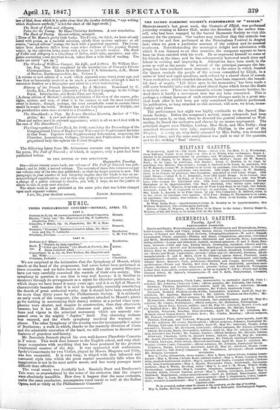MUSIC.
THIRD PHILHARMONIC CONCERT-MONDAY, APRIL 12.
PART I.
Sinfonia in D, Op. 88 (never performed at these Concerts). Mozart. Duetto, "Dove val.," Mr. Manvers and sig. F. Lablache, (Guglidmo Tell) Rossini. Concerto, F Minor, Op. 19, Planoibrte, Mr. W. S. Ben-
nett. Bennett. Terzetto, Trem ate." Madame Caradori Allan, Mr. Man- vets, and Sig. F. Lablache. Beethoven.
Overture, Preciosa . C. M. Von Weber.
PART II.
Sinfonla in C Minor Beethoven.
neatPlaisirs du rang supreme." Air • "Coin! que faimais " (La Nue& de Portia), Ma- Auber. 't dame Caradori Allan Coneertante in A, Op. 48, Two Violins, Mr. Blagrove and
Mr. Willy Spohr.
Overture, Lodoiska Cherubini.
We are surprised at the intimation that the Symphony of Mozart, which stands at the head of the programme, had never before been performed at these concerts; and we have reason to suspect that the present Directors have not very carefully examined the records of their own society. The symphony in question is one that is very well known: it is familiar to amateurs through its arrangement as a septet for chamber-performance, in which shape we have heard it many years ago; and it is so full of Mozart's characteristic beauties that it is next to impossible, especially considering the dearth of great orchestral works, that it should have been overlooked for more than thirty years by the Philharmonic Society. It is evidently an early work of the composer, (the numbers attached to Mozart's pieces go for nothing in ascertaining their dates,) written at a period when sym- phonies were shorter, and simpler in construction, than they afterwards became; but it has all Mozart's clearness and grace, with traces of force and vigour in the principal movement which are scarcely sur- passed even in the mighty " Jupiter " itself. The charming andante was encored, and the whole symphony received the warmest ap- plause. The other Symphony of the evening was the incomparable C minor of Beethoven; a work in which, thanks to the masterly direction of Costa and the admirable execution of the band, we still continue to discover new features of grandeur and beauty. Mr. Sterndale Bennett played his own well-known Pianoforte Concerto in F minor. This work does honour to the English school, and may chal- lenge comparison with anything that has been produced by the greatest Continental masters of the day. It was applauded with enthusiasm. Spohr's Concertante for two Violins, played by Messrs. Blagrove and Willy, WRB leas successful. It is very long; is tinged with that laboured and tot/1=W style into which the great master occasionally falls when his Imagination is not in its most active mood; and has many passages more difficult than effective.
The vocal music was decidedly bad. Rossinrs Duet and Beethoven's Trio were so overwhelmed by the noise of the orchestra that the singers were absolutely inaudible. How does it happen that the same orchestra, under the same conductor, accompanies vocal music so well at the Italian Opera, and so vilely at the Philharmonic Concerts?


























 Previous page
Previous page